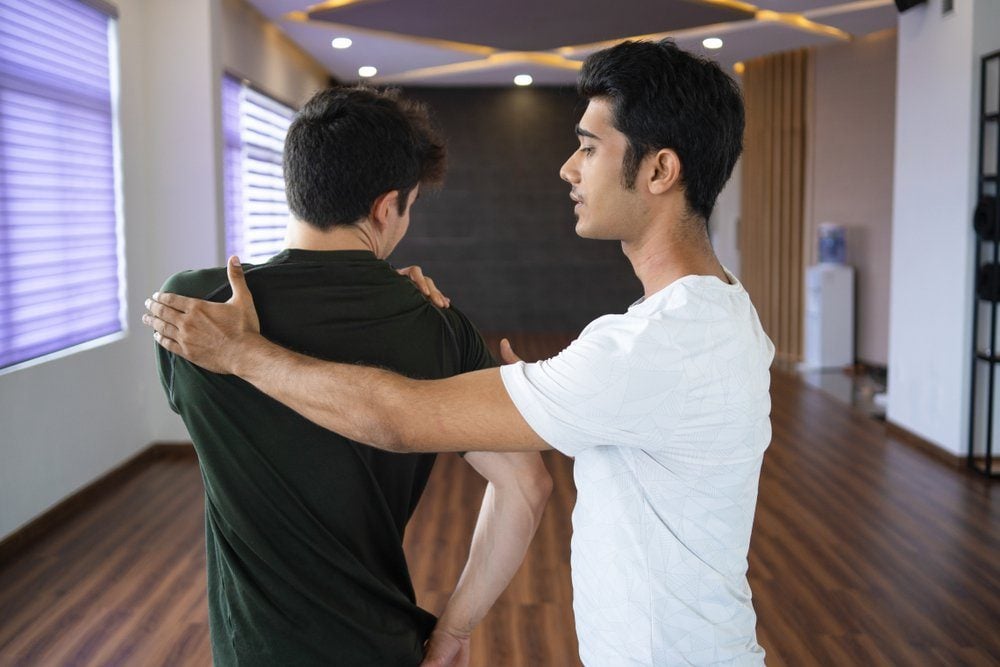What Happens to Your Body When You Crack Your Back
That short moment of relief from back cracking is likely doing more harm than good. Here's what doctors advise.

Is back cracking harmful for you?
Whether you do it on purpose or by accident, you can “crack” your back the same way you crack your knuckles—and that doesn’t mean you’re fracturing or cracking bones or cartilage. The sound indicates the shifting of spinal joints, says chiropractor Chris Vargas, DC. “That cracking sound that people hear is the release of gas bubbles within the spinal joints,” he says. When your spine is out of alignment, the joints can swell and fill with bubbles that may pop when you move certain ways, according to Dr. Vargas.
These gas pockets of nitrogen, oxygen, and carbon dioxide in the joint fluid reaccumulate over time, which is why we can’t usually crack the same joint several times in a row, according to Joshua Scott, MD, primary-care sports medicine physician at Cedars-Sinai Kerlan-Jobe Institute in Los Angeles. According to Dr. Vargas, the back tends to crack after you’ve been stuck in the same position for a long time—especially if you’re hunched or slumped. For example, he notes, after you’ve been sitting at a desk all day, your back may pop as you straighten, bend, or move about and your spine shifts back into its normal alignment. (Here are five of the best exercises for seniors to build strength.)
Although back cracking can be a happy accident, some people do it intentionally, Dr. Vargas explains. Typically, they do it to relieve discomfort caused by misalignment, he says. Sometimes people will twist or move in a way they know will pop their spinal joints simply because it feels good, according to the experts at Atlantic Brain & Spine. Researchers found in a 2011 study that people associate the sound of releasing joints with relief—even if the adjustment doesn’t do much. Some chiropractors claim that cracking your back can release feel-good substances called endorphins. (As for how to relieve chronic back pain—here’s our best advice.)
Despite how good it may feel to crack your back, most experts agree that doing it frequently isn’t worth the temporary relief: Habitual back crackers could end up with chronic back pain from damaged discs and nerves; the repeated twisting may cause excessive wear on your spinal joints, experts say. The primary concern is that popping your back may not address the root of your spinal issues—especially since you could be manipulating the wrong joints, warns chiropractor William Charschan, DC, CCSP. Many people who crack their backs daily actually have spinal subluxation—their vertebrae are misaligned, according to Dr. Vargas. Cracking your back only moves the joints that are compensating for the subluxation. “So over time, they will make the primary problem worse, or they will wear down the compensating joints,” he says. (Learn the common causes of back pain.)
Although routine back cracking could do more harm than good, the occasional pop—like the once you might experience after a long day of sitting—is no cause for concern. “If you are moving your spine through normal ranges of motion without the use of any additional force, and you happen to hear that cracking sound, this is considered safe,” Dr. Vargas says. “Outside of that, any introduction of force to a spinal joint should be performed by a chiropractor.”
Dr. Scott notes that people who crack their backs once in a while are unlikely to hurt themselves: Your body naturally limits your movements to protect the spinal cord. However, repetitive and habitual back cracking can stretch the ligaments around the spine, allowing excessive movement, joint instability, and an unstable body, says Dr. Scott.
This teacher’s back pain turned out to be a life-threatening condition.



